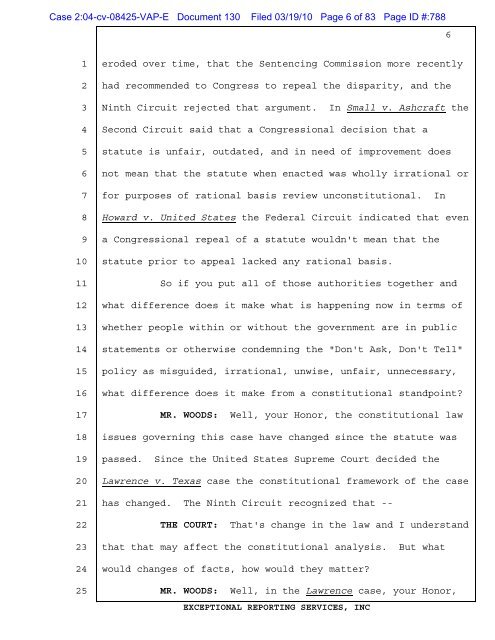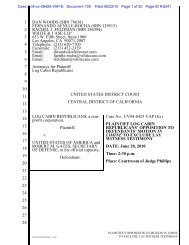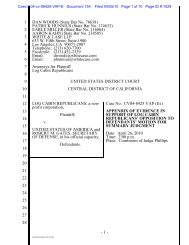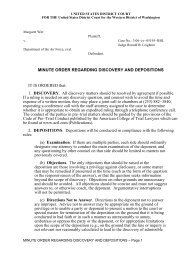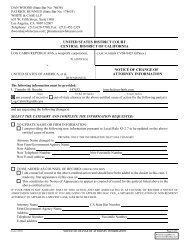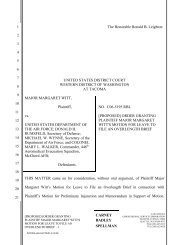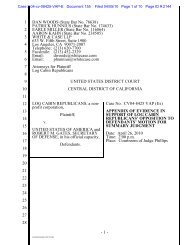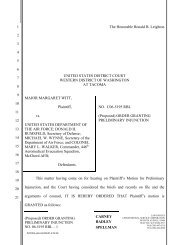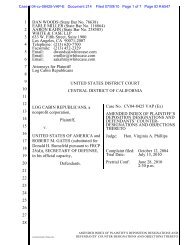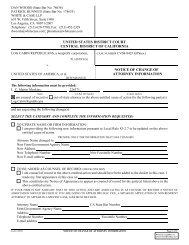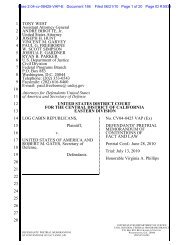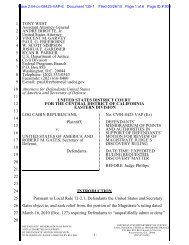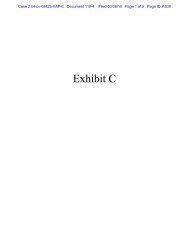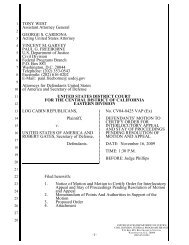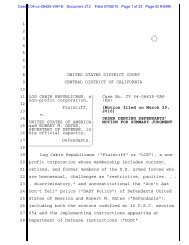Plantiff's Motion to Compel Production of Documents - The DADT ...
Plantiff's Motion to Compel Production of Documents - The DADT ...
Plantiff's Motion to Compel Production of Documents - The DADT ...
You also want an ePaper? Increase the reach of your titles
YUMPU automatically turns print PDFs into web optimized ePapers that Google loves.
Case 2:04-cv-08425-VAP-E Document 130 Filed 03/19/10 Page 6 <strong>of</strong> 83 Page ID #:788<br />
1<br />
2<br />
3<br />
4<br />
5<br />
6<br />
7<br />
8<br />
9<br />
10<br />
11<br />
12<br />
13<br />
14<br />
15<br />
16<br />
17<br />
18<br />
19<br />
20<br />
21<br />
22<br />
23<br />
24<br />
25<br />
eroded over time, that the Sentencing Commission more recently<br />
had recommended <strong>to</strong> Congress <strong>to</strong> repeal the disparity, and the<br />
Ninth Circuit rejected that argument. In Small v. Ashcraft the<br />
Second Circuit said that a Congressional decision that a<br />
statute is unfair, outdated, and in need <strong>of</strong> improvement does<br />
not mean that the statute when enacted was wholly irrational or<br />
for purposes <strong>of</strong> rational basis review unconstitutional. In<br />
Howard v. United States the Federal Circuit indicated that even<br />
a Congressional repeal <strong>of</strong> a statute wouldn't mean that the<br />
statute prior <strong>to</strong> appeal lacked any rational basis.<br />
So if you put all <strong>of</strong> those authorities <strong>to</strong>gether and<br />
what difference does it make what is happening now in terms <strong>of</strong><br />
whether people within or without the government are in public<br />
statements or otherwise condemning the "Don't Ask, Don't Tell"<br />
policy as misguided, irrational, unwise, unfair, unnecessary,<br />
what difference does it make from a constitutional standpoint?<br />
MR. WOODS: Well, your Honor, the constitutional law<br />
issues governing this case have changed since the statute was<br />
passed. Since the United States Supreme Court decided the<br />
Lawrence v. Texas case the constitutional framework <strong>of</strong> the case<br />
has changed. <strong>The</strong> Ninth Circuit recognized that --<br />
THE COURT: That's change in the law and I understand<br />
that that may affect the constitutional analysis. But what<br />
would changes <strong>of</strong> facts, how would they matter?<br />
MR. WOODS: Well, in the Lawrence case, your Honor,<br />
EXCEPTIONAL REPORTING SERVICES, INC<br />
6


